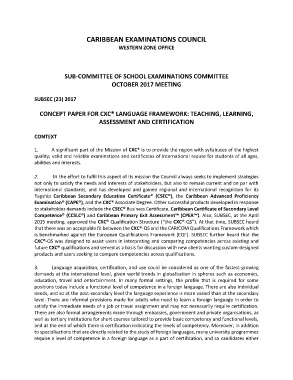Page 1474 - SUBSEC October 2017_Neat
P. 1474
CARIBBEAN EXAMINATIONS COUNCIL
WESTERN ZONE OFFICE
SUB-COMMITTEE OF SCHOOL EXAMINATIONS COMMITTEE
OCTOBER 2017 MEETING
SUBSEC (23) 2017
CONCEPT PAPER FOR CXC® LANGUAGE FRAMEWORK: TEACHING, LEARNING,
ASSESSMENT AND CERTIFICATION
CONTEXT
1. A significant part of the Mission of CXC® is to provide the region with syllabuses of the highest
quality; valid and reliable examinations and certificates of international repute for students of all ages,
abilities and interests.
2. In the effort to fulfil this aspect of its mission the Council always seeks to implement strategies
not only to satisfy the needs and interests of stakeholders, but also to remain current and on par with
international standards, and has developed and gained regional and international recognition for its
flagship Caribbean Secondary Education Certificate® (CSEC®), the Caribbean Advanced Proficiency
Examination® (CAPE®), and the CXC® Associate Degree. Other successful products developed in response
to stakeholder demands include the CSEC® Business Certificate, Caribbean Certificate of Secondary Level
Competence® (CCSLC®) and Caribbean Primary Exit Assessment™ (CPEA™). Also, SUBSEC, at the April
2015 meeting, approved the CXC® Qualification Structure (“the CXC®-QS”). At that time, SUBSEC heard
that there was an acceptable fit between the CXC®-QS and the CARICOM Qualifications Framework which
is benchmarked against the European Qualifications Framework (EQF). SUBSEC further heard that the
CXC®-QS was designed to assist users in interpreting and comparing competencies across existing and
future CXC® qualifications and served as a basis for discussion with new clients wanting custom-designed
products and users seeking to compare competencies across qualifications.
3. Language acquisition, certification, and use could be considered as one of the fastest-growing
demands at the international level, given world trends in globalisation in spheres such as economics,
education, travel and entertainment. In many formal settings, the profile that is required for some
positions today include a functional level of competence in a foreign language. There are also individual
needs, and so at the post-secondary level the language experience is more varied than at the secondary
level. There are informal provisions made for adults who need to learn a foreign language in order to
satisfy the immediate needs of a job or travel assignment and may not necessarily require certification.
There are also formal arrangements made through embassies, government and private organisations, as
well as tertiary institutions for short courses tailored to provide basic competency and functional levels,
and at the end of which there is certification indicating the levels of competency. Moreover, in addition
to specialisations that are directly related to the study of foreign languages, many university programmes
require a level of competence in a foreign language as a part of certification, and so candidates either

